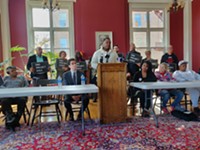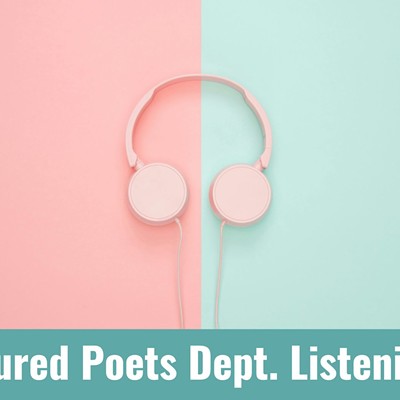[
{
"name": "500x250 Ad",
"insertPoint": "5",
"component": "15667920",
"parentWrapperClass": "",
"requiredCountToDisplay": "1"
}
]
Signs opposing the SAFE Act appear along roadsides and front lawns in Monroe and surrounding counties like patches of clover. And chances are you've driven behind vehicles with bumper stickers calling for the law's repeal.
But signs supporting Governor Andrew Cuomo's signature gun-control legislation are harder to find. That doesn't mean the controversial law, approved in 2013 and considered among the toughest gun-safety legislation in the nation, is unpopular with the general public. Far from it, says Lea Gunn Barrett, executive director of New Yorkers Against Gun Violence. Barrett will be in Rochester next month.
A recent survey conducted by Sienna College Research Institute shows that 63 percent of New Yorkers support the SAFE Act, Barrett says, while 32 percent oppose it. Support is particularly strong among Democrats, women, and minorities. More than 60 percent of African Americans and 55 percent of Latinos support the law, Barrett says.
Regionally, however, the numbers change sharply. Only 25 percent of upstate residents support the SAFE Act, the poll says, while a solid 70 percent oppose it.
Barrett says that, in response to the poll, she's visiting upstate cities to educate people about gun safety. She's in the early stages of expanding her organization's reach by forming new upstate chapters of the mostly downstate organization.
"We're working on developing a more robust presence in Rochester and Buffalo," Barrett says.
Formed in 1993 by a group of mothers galvanized by the shooting of a Brooklyn teacher, NYAGV was instrumental in the passage of the SAFE Act, Barrett says. The nonprofit has 10,000 members.
The idea that the SAFE Act is largely a political response to gun violence in New York City is inaccurate, she says.
"There is a problem here, but the problem is statewide and nationwide," Barrett says.
She'll speak at 7 p.m. on Tuesday, June 17, at the First Universalist Church, 150 South Clinton Avenue. The event is free and open to the public.
New Yorkers, like many people around the country, are fed up with gun violence, Barrett says. More than 1,010 people died by guns in 2010 — the most recent year that numbers are available from the Centers for Disease Control, she says.
The SAFE Act is reasonable and rational legislation, she says. And while there is some vocal opposition, she says, the law is working.
"It's still in the early days; it's only been 16 months," Barrett says. "Yet we are seeing some good results from it. Incidents of gun violence have dropped by 4.5 percent since the SAFE Act was enacted."
More than 2,000 people were charged with crimes under the SAFE Act between March 2013 and April 2014; 77.6 percent were charged with criminal possession of a firearm. The SAFE Act elevates the offense from a misdemeanor to a Class E felony.
Thirty-two people have been charged with possession of a weapon on school grounds — another Class E felony.
But Barrett says that educating people about the SAFE Act is difficult because of intimation and misinformation by the gun lobby.
Guns are the only consumer product exempt from regulation by the Consumer Product Safety Commission, she says, which is ironic considering their impact on public safety. This is why the SAFE Act is so vital, Barrett says.
"The new law requires background checks of all gun sales, including private sales, which was not the case before the SAFE Act was passed," she says. "It closes the private sales loophole so that any gun sales between private individuals except family members must be subject to the federal National Instant Criminal Background Check. And that is very significant. If you're trying to reduce gun violence, you have to keep them out of the wrong hands."
But the most controversial part of the law deals with assault weapons. Assault weapons owned before the SAFE Act went into effect in January 2013 had to be registered within a year and must be re-certified every five years.
The SAFE Act initially limited magazine capacity to seven, but the law was amended. Magazines can now have a capacity for 10 rounds, but can only contain seven at any time.
"It's important to limit the magazines so that if you are in a situation where an individual is committing mass murder, they will have to stop to change magazines," Barrett says. "There's an opportunity there to stop them from continuing the rampage."
The SAFE Act also requires background checks on ammunition sales and creates a database for sellers of ammunition. This helps law enforcement identify gun traffickers, Barrett says.
And the "Webster provision" makes murder of a first responder a Class A-1 felony, with a mandatory sentence of life in prison without parole. The name comes from a 2012 ambush in which two firefighters were killed.
NYAGV is now focusing its support on new bills, particularly those ensuring greater protection of children. Gun violence is the second leading cause of death among children and teens in the US, with one child killed or injured every 30 minutes, according to the Centers for Disease Control.
NYAGV supports the Child Access Prevention or Safe Storage bill, also called Nicholas's Law. In 2010, 12-year-old Nicholas Naumkin was shot in the head while playing at a friend's house. The gun was not kept in a secure place, Barrett says.
"We secure medicine cabinets and we put gates at the top of stairs for our children's protection," she says. "And yet the one consumer product specifically designed to kill people is too often the one we don't feel it's important to secure."
Nickolas's Law would require safe storage of all guns. The bill is at the committee level in the State Assembly, and there is no matching Senate version.
Despite the opposition's claims that the SAFE Act infringes on the Second Amendment and that its real purpose is to confiscate guns from law-abiding citizens, the law has withstood two court challenges. The SAFE Act is not about taking people's guns away, Barrett says. It's about protecting people, she says, and requiring responsible gun ownership.
"The Supreme Court decision held that the Second Amendment says, 'the individual has the right to possess a firearm irrespective of whether you're in the military or not.'" Barrett says. "But they also said, 'Like most rights, this right is not unlimited; it is not absolute.'"
Speaking of...
-

URMC speaker: Structural racism a root cause of urban gun violence
May 7, 2021 -

RCSD superintendent on crime wave: 'This has to stop'
Apr 28, 2021 -

Groups take aim at Project Exile
Oct 25, 2019 - More »
Latest in News
More by Tim Louis Macaluso
-

RCSD financial crisis builds
Sep 23, 2019 -

RCSD facing spending concerns
Sep 20, 2019 -

Education forum tomorrow night for downtown residents
Sep 17, 2019 - More »






